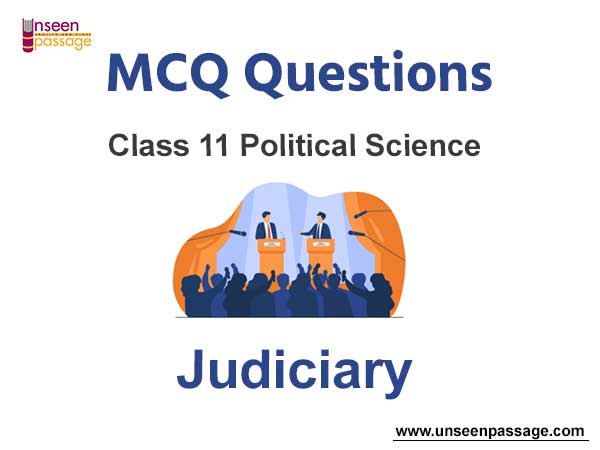Judiciary MCQ Questions Class 11 Political Science
Please refer to Chapter 6 Judiciary MCQ Class 11 Political Science with answers below. These multiple-choice questions have been prepared based on the latest NCERT book for Class 11 Political Science. Students should refer to MCQ Questions for Class 11 Political Science with Answers to score more marks in Grade 11 Political Science exams. Students should read the chapter Judiciary and then attempt the following objective questions.
MCQ Questions Class 11 Political Science Chapter 6 Judiciary
Judiciary MCQ Class 11 Political Science provided below covers all important topics given in this chapter. These MCQs will help you to properly prepare for exams.
Question. The primary function of the judiciary is ______.
(a) making laws
(b) executing laws
(c) adjudication
(d) make appointments
Answer
C
Question. What it the full form of PIL?
(a) Public Illegal Law
(b) Public Interest Litigation
(c) Personal Interest Litigation
(d) Public Interest Limited
Answer
B
Question. The judges of the Supreme Court of India are appointed by the
(a) President
(b) Vice President
(c) Prime Minister
(d) Home Minister
Answer
A
Question. Which of the following are the jurisdictions of the Supreme Court?
(a) Original jurisdiction
(b) Appellate jurisdiction
(c) Advisory jurisdiction
(d) All of these
Answer
D
Question. In Golaknath vs the State of Punjab case, the Supreme Court was led by Chief Justice
(a) Suba Rao
(b) R. S. Pathak
(c) J. S. Verma
(d) R. C. Lahoti
Answer
A
Question. Who defined the functions and responsibilities of the Supreme Court?
(a) Law of the land
(b) Supreme court
(c) Supreme court tribunal
(d) Constitution
Answer
D
Question. Supreme Court consists of one Chief Justice and:
(a) 13 other Judges
(b) 25 other Judges
(c) 20 other Judges
(d) 30 other Judges
Answer
D
Question. Number of Judges of the Supreme Court is fixed by:
(a) Parliament
(b) Prime Minister
(c) President
(d) Cabinet.
Answer
A
Question. The number of Judges is Supreme Court of India is
(a) 26
(b) 30
(c) 18
(d) 25
Answer
A
Question. Which is not the issue of original jurisdiction of Supreme Court of India
(a) Dispute of fundamental rights
(b) Dispute between States
(c) Interpretation of the constitution
(d) To give opinion to president
Answer
D
Question. The High Court of Delhi came up in
(a) 1950
(b) 1959
(c) 1966
(d) 1970
Answer
C
Question. Supreme Court sits at:
(a) Chandigarh
(b) Delhi
(c) Kolkata
(d) Shimla
Answer
B
Question. Under which Article High Courts also have the power to issue writs?
(a) Article 32
(b) Article 13
(c) Article 226
(d) Article 356
Answer
C
Question. which criterion does independence of judiciary does not include?
(a) organs of government not to restrain functioning of judiciary
(b) organs of government to interfere in decision making
(c) to be able to perform without fear.
(d) to be able to work effectively
Answer
A
Question. The process of judicial appointments is influenced by:
(a) Council of Ministers, Governors and Chief Ministers and Chief Justice of India
(b) President
(c) Election Commissioner of India
(d) Comptroller and Auditor General
Answer
A
Question. The executive plays a crucial role; the legislature has the powers of removal. This has ensured
(a) Balance of Power
(b) Judicial Interpretation
(c) Separation of Power
(d) Both balance of power and independence of the judiciary
Answer
D
Question. The salaries and allowances of the judges’ are determined by
(a) Parliament
(b) Executive
(c) Judiciary
(d) President
Answer
A
Question. A judge of a High Court can be transferred to another
(a) High Court by the Prime Minister
(b) Supreme Court by the Chief Justice of India
(c) High Court on the recommendation of the Chief Minister of a State
(d) High Court by the President after consultation with the Chief Justice of India
Answer
D
Question. By convention who is appointed as the chief justice of India?
(a) Senior-most judge of the High Court
(b) Junior-most judge of the Supreme Court
(c) Senior-most judge of the Supreme Court
(d) Senior Member of Law Commission
Answer
C
Question. The Judges of the Supreme Court of India retire at the age of:
(a) 62 years
(b) 65 years
(c) 60 years
(d) 50 year
Answer
B
Question. Where is H.Q. of Supreme Court of India
(a) New Delhi
(b) Mumbai
(c) Bangalore
(d) Kolkata
Answer
A
Question. Who appoints the judges of the High Court?
(a) The President of India
(b) The Prime Minister of India
(c) The governor of Delhi
(d) The Chief Justice of the Supreme Court
Answer
A
Question. What is the maximum number of judges of the Supreme Court of India including the Chief Justice?
(a) 20
(b) 21
(c) 26
(d) 34
Answer
D

We hope you liked the above Judiciary MCQ Class 11 Political Science. In case you have any questions please put them in the comments box below and our teachers will provide you a response.
